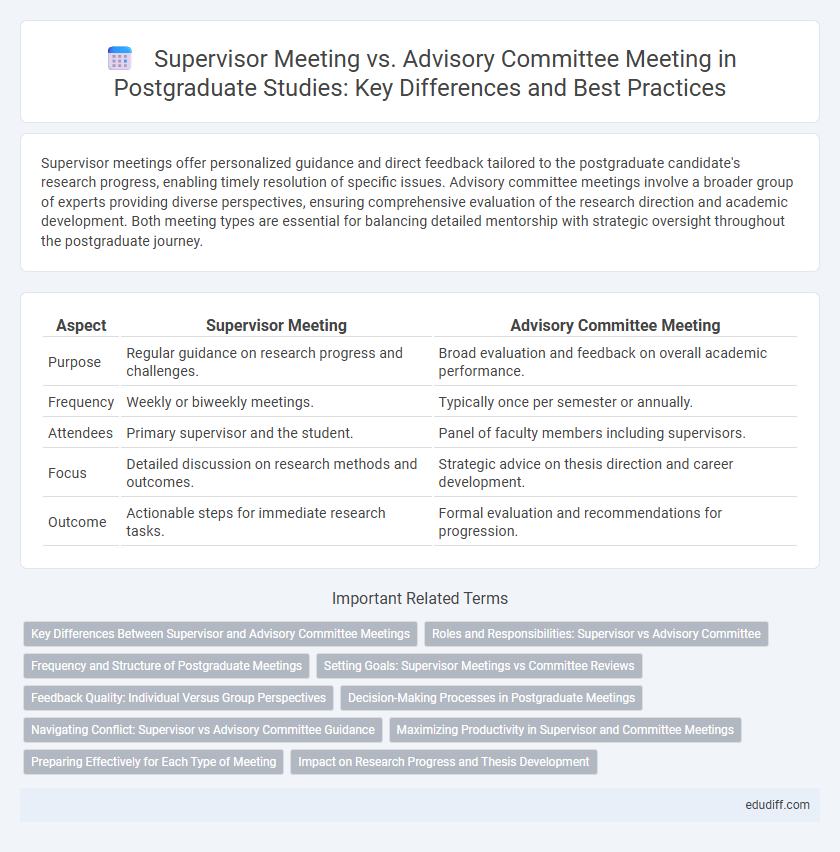Supervisor meetings offer personalized guidance and direct feedback tailored to the postgraduate candidate's research progress, enabling timely resolution of specific issues. Advisory committee meetings involve a broader group of experts providing diverse perspectives, ensuring comprehensive evaluation of the research direction and academic development. Both meeting types are essential for balancing detailed mentorship with strategic oversight throughout the postgraduate journey.
Table of Comparison
| Aspect | Supervisor Meeting | Advisory Committee Meeting |
|---|---|---|
| Purpose | Regular guidance on research progress and challenges. | Broad evaluation and feedback on overall academic performance. |
| Frequency | Weekly or biweekly meetings. | Typically once per semester or annually. |
| Attendees | Primary supervisor and the student. | Panel of faculty members including supervisors. |
| Focus | Detailed discussion on research methods and outcomes. | Strategic advice on thesis direction and career development. |
| Outcome | Actionable steps for immediate research tasks. | Formal evaluation and recommendations for progression. |
Key Differences Between Supervisor and Advisory Committee Meetings
Supervisor meetings typically involve direct, one-on-one interactions focused on the student's research progress, immediate challenges, and detailed guidance, ensuring alignment with project milestones. Advisory committee meetings encompass a broader panel of experts providing diverse perspectives, strategic feedback, and formal evaluation of academic progress and adherence to program requirements. While supervisor meetings offer personalized mentorship, advisory committee meetings serve as formal checkpoints to assess overall research direction and academic standards.
Roles and Responsibilities: Supervisor vs Advisory Committee
Supervisors provide direct, ongoing guidance tailored to the postgraduate student's research progress, offering technical expertise and regular feedback to ensure the project meets academic standards. Advisory committees consist of multiple faculty members who provide broader, periodic oversight, evaluating the overall trajectory, methodological soundness, and academic rigor of the research at key milestones. While supervisors focus on day-to-day mentorship and skill development, advisory committees are responsible for maintaining quality assurance and impartial assessment throughout the postgraduate journey.
Frequency and Structure of Postgraduate Meetings
Supervisor meetings typically occur more frequently, often weekly or biweekly, providing direct, focused guidance on research progress and immediate problem-solving. Advisory committee meetings are scheduled less frequently, usually once or twice per semester, involving multiple faculty members who provide broader evaluative feedback on the overall direction and milestones of the postgraduate research. The structured format of advisory committee meetings includes presentations and formal assessments, whereas supervisor meetings tend to be more informal and flexible.
Setting Goals: Supervisor Meetings vs Committee Reviews
Supervisor meetings focus on setting specific, short-term goals tailored to the postgraduate's ongoing research progress and immediate challenges. Advisory committee meetings review broader objectives and milestones, providing strategic guidance and ensuring alignment with overall academic and institutional standards. Regular supervisor interactions foster detailed planning, while committee reviews offer comprehensive assessment and goal recalibration.
Feedback Quality: Individual Versus Group Perspectives
Supervisor meetings typically provide personalized and detailed feedback tailored to the specific research progress and challenges of a postgraduate student. Advisory committee meetings offer a broader range of perspectives by incorporating input from multiple experts, enriching the feedback with diverse insights and interdisciplinary approaches. The combination of individual supervision and group advisory input enhances the overall feedback quality, balancing depth with breadth in postgraduate research guidance.
Decision-Making Processes in Postgraduate Meetings
Supervisor meetings involve direct, frequent interactions aimed at guiding research progress and making immediate decisions on study direction and problem-solving. Advisory committee meetings, by contrast, feature a broader panel of experts providing strategic input and formal approval on critical milestones, ensuring compliance with academic standards. Decision-making in supervisor meetings is typically agile and detail-oriented, whereas advisory committee meetings emphasize consensus-building and institutional oversight.
Navigating Conflict: Supervisor vs Advisory Committee Guidance
Navigating conflicts between a postgraduate supervisor and advisory committee requires clear communication and understanding of each party's role in the research process. Supervisors typically offer day-to-day guidance and technical expertise, while advisory committees provide broader academic perspectives and ensure research quality. Balancing conflicting advice involves prioritizing the project's goals, seeking consensus where possible, and leveraging institutional policies to mediate disagreements effectively.
Maximizing Productivity in Supervisor and Committee Meetings
Maximizing productivity in postgraduate supervisor meetings involves setting clear agendas, focusing on specific research milestones, and maintaining consistent communication to track progress effectively. Advisory committee meetings require detailed preparation, including presenting comprehensive updates and addressing committee feedback to refine research direction and ensure academic standards. Leveraging structured meeting formats and targeted discussions enhances decision-making efficiency and supports timely thesis completion.
Preparing Effectively for Each Type of Meeting
Preparing effectively for a supervisor meeting involves setting clear objectives, reviewing recent progress, and preparing specific questions or areas of concern to maximize one-on-one feedback. Advisory committee meetings require comprehensive documentation, including progress reports and research summaries, to facilitate constructive multi-expert discussions and obtain diverse input. Utilizing tailored agendas and pre-circulated materials enhances productivity and aligns expectations for both supervisory formats.
Impact on Research Progress and Thesis Development
Supervisor meetings provide focused, regular guidance tailored to immediate research challenges, enabling timely adjustments and sustained thesis momentum. Advisory committee meetings offer multidisciplinary feedback and strategic insights that enhance research quality and broaden academic perspectives. Combining both meeting types optimizes thesis development by integrating detailed supervision with comprehensive scholarly evaluation.
Supervisor Meeting vs Advisory Committee Meeting Infographic

 edudiff.com
edudiff.com